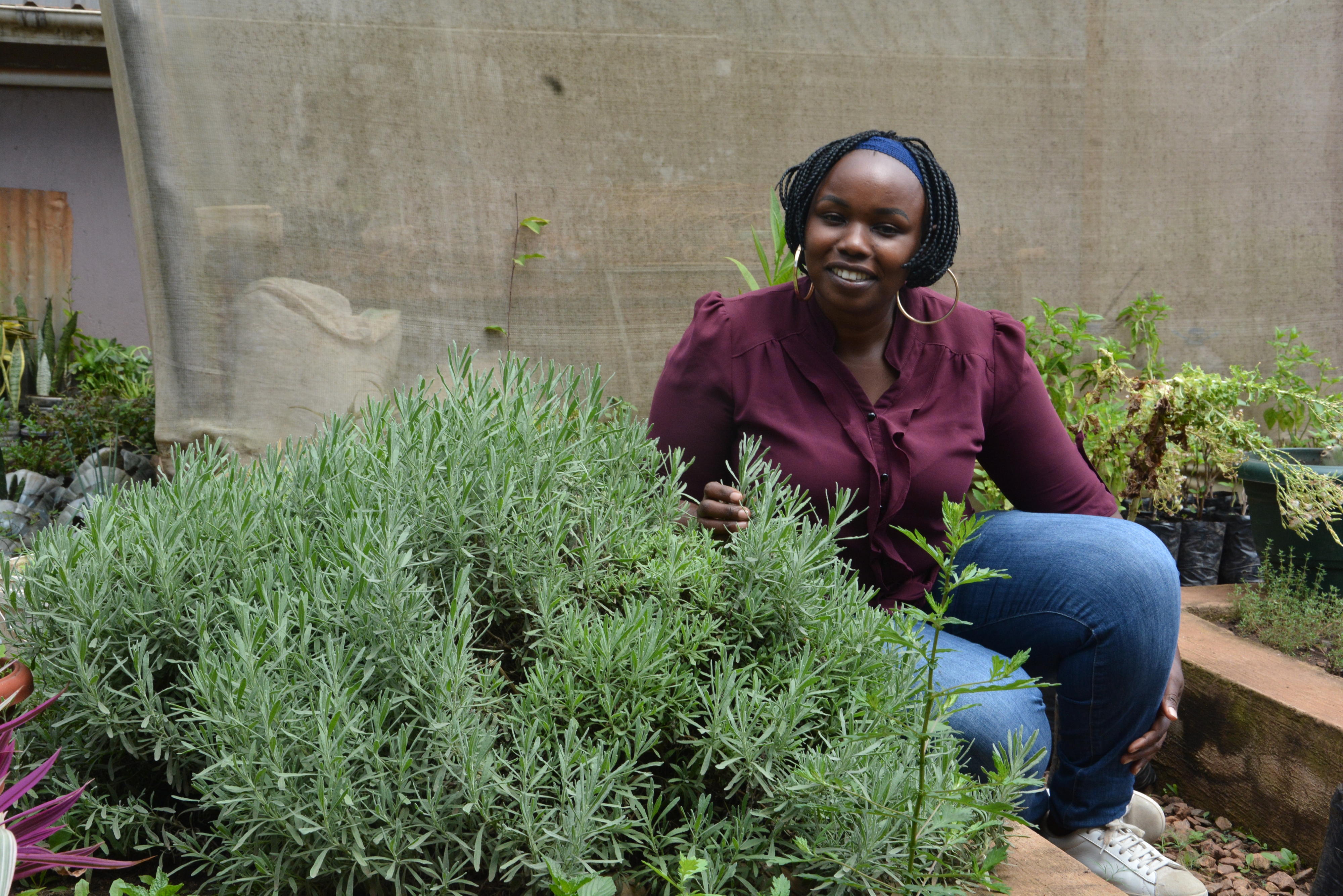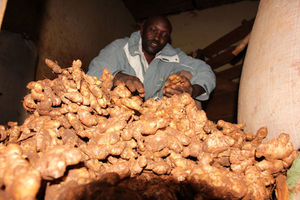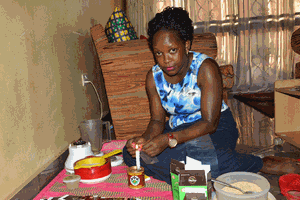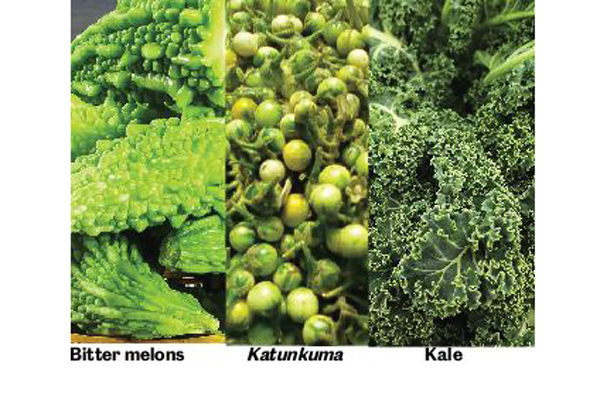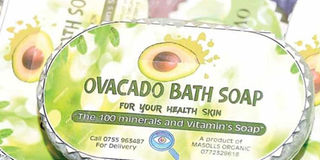
Some of the soap made by farmers on display. Photo/ABUBAKER LUBOWA
The scent of lemon grass fills air. The sources is a steam boiler seated atop a charcoal stove. Attached to the boiler is translucent tube through which a hot liquid trickles into a condenser before dripping into a separator.
Therein, the essential oils and the water are separated. Each is placed into a separate container awaiting use for different purposes.
That is part of the elaborate which albeit rudimentary process, through essential oils are being extracted from natural plants using the water and steam distillation process.
The essential oils are integral to the manufacture of a variety of consumer goods. The range includes detergents, toilet products, cosmetics, pharmaceutical, perfumes, confectionary food products, soft drinks, distilled alcoholic beverages and insecticides.
Working under the umbrella of the Mawokota South Local Leaders’ Constituency Savings and Credit Cooperative Society (Sacco), the Local Council (LC) leaders drawn from the 26 parishes in the constituency have for the last four years been using money lent to them under the Emyooga programme to extract essential oils from different plant varieties in their surroundings.
The Emyooga programme is a presidential initiative at creating wealth and jobs. The idea is to help 68 percent of households in Ugandan transit from subsistence to market oriented production.
Genesis
The leader’s Sacco is one of the many different groups that were trained by the Microfinance Support Centre (MSC) staff in financial literacy following the launch by President Museveni, of the Emyooga programme in August 2019.
It also followed that they were one of the first groups to get a loan, receiving Shs50 million in 2020, most of which was distributed with Shs28.5 million going to LCs’ groups in six parishes namely, Nkozi A, Busese Nkozi B, Uganda Matyrs University/Nkozi Hospital, Busese B, and Mbizinya, but it was only groups in Nkozi A and Uganda Martyrs that were able to service their loans.
Mr Ibrahim Kamoga, the LC1 chairman of Nkozi A cell, who also doubles as the chairperson of the Supervisory Board of the Sacco, says that the situation forced the LCs to go back to the drawing board.
“The executive agreed that we would continue to struggle getting loans and repaying them for as long as there was nothing to bind us,” Mr Kamoga says.

Mr Jacob Kizza Mukiibi the manager of the sacco explains how he makes his products with herbs.

Mr Jacob Kizza Mukiibi the manager of the sacco explains how he makes his products with herbs.
Opportunity
Rev Richard Byamukama, the chairman of the Sacco, says that it was agreed production of everyday needs would be the best.
“A normal human being will not stop taking a bath. A normal human being will not stop wanting to look good by using a good body oil. A person will never cease using medicines. That is why we made a foray into the production of soap and body oils. I talked of medicine because some of the oils we make are medicinal,” Rev Byamukama says.
After some of the leaders underwent training with Mr Julius Nyanzi, the bio-entrepreneur, scientist and researcher, the Sacco set up its office and small factory in Nkozi A cell.
Products
In Nkozi, the Mawokota LCs use the essential oils to produce soap, body oils, perfumes and medicinal oils.
The Sacco produces both bath and laundry soap. Laundry soap is sold at Shs4,000 a bar, while bathing soap, mostly made out of avocado is sold at Shs2,500 per a piece. A pack of six is sold at Shs15,000.
They also make much small pieces of soap which are sold to lodges and guest houses within Nkozi and nearly trading centres such as Kayabwe.
“We thought of small pieces of soap for the lodges and guest houses because we thought that it would help us increase our earnings from the soap making operations,” Mr Kamoga says.
Essential oils
The biggest business operation is however the essential oils. The Sacco is involved in the extractions of essential oils from a variety of plants and trees including among others rosemary, eucalyptus, lemon grass, citrus, oyster, candlenut, coffee beans, sunflower, coconut and pumpkin seeds. Other oils are also extracted from flowers and trees.
What to target for the said extraction is sometime as much about science as it is about the expected returns.
“We also utilise and research using the internet. We research on each of the items and find out the kind of ailments that they can treat. Many people have indeed used some of our products and returned to testify to their effectiveness,” Rev Byamukama says.
Medicinal oils
Some of the oils manufactured are believed to have medicinal components. According to fliers that the Sacco circulates, rosemary oils is for example said to have the capacity to among other things improve bloods circulation, improve functions of the brain, stimulate growth of hair and repel certain bugs and insects including mosquitos. Another popular oil is pumpkin seed oil. This one is associated with the treatment of erectile dysfunction. It is generally said to improve male sexual and bladder health. It is also associated with the stabilization of blood sugar.
Oyster nut oil is also another popular product from the Sacco. It is known to be rich in Vitamins D and B12, Zinc and Copper, Omega3 and proteins.
It is at the same time associated with male sexual health. It is said to have capacity to boost Testosterone levels in Men. The testosterone hormone is most often associated with sex drive. It plays a vital role in sperm production.
According to the electronic publication, www.healthline.com, which covers a wide range of health issues, low testosterone levels in men, also known as low T levels results into a variety of symptoms in men. Those include weight gain, depression, moodiness, low self-esteem, less body hair, thinner bones and above all, decreased sex drive.

Caster seeds on display. From these seeds farmers extract cooking oil.
This perhaps explains why the oyster nut oil is one of the Sacco’s most popular products.
Lemon eucalyptus oil is believed to be good for dealing with the effects of among others morning sickness in pregnant women, while candlenut oils is said to be good when it comes to moisturising the skin and as a massage oil.
Packaging
The Saccos sells its products on both retail and in bulk. The oils and perfumes are usually packed into two small bottles of different sizes. The smaller of the two costs Shs10,000 per a bottle, while the bigger one costs Shs20,000 per a bottle.
The cheapest litre of essential oils costs Shs200,000, while the most expensive is the night rose flower oil, a litre of which costs Shs5million.
Markets
The core market for now are the members of the Sacco, but the biggest market are people involved in bio-research and some of their bigger rivals in the manufacture of the same products that they produce.
If what Mr Kamoga says is anything to go by the Sacco has thanks to this enterprise been able to bring in some money.
“This project helped us to recover what had been written off as bad loans that certain associations took, but did not pay,” Mr Kamoga says.
The problem though is that some of the people that they supply take too long to pay for the products, which holds up some of their working capital.
Challenges
“Even a wizard”, as they say, “would like to perform his magic on a big stage, but he has to have his magic wand with him”.
The leadership of Mawokota leaders Sacco would also love to operate on the big stage and produce different products at a higher level, but lack of adequate finances to fund acquisition of bigger machines and equipment is standing in the way. What is in place are low capacity machines that were bought using both members’ savings and the few millions out of the Shs50 million Emyooga loan that had remained after they lent money to some of their groups.
“Most of these machines here are manual. The machine that we for example use to extract coffee is manual. How much time and energy would it take before one would be able to process enough coffee to meet the demands of the market? We have a drier that helps us dry fruits like bananas and plantains, but the drier is small. So we need bigger machines in order to operate at a bigger level,” Mr Kamoga says.
State Minister for Microfinance, Mr Haruna Kasolo promised them bigger machines, but is yet to deliver.
Mr Jacob Kiiza Mukiibi, the manager in charge of the Sacco’s manufacturing section says that meeting the stringent demands by the Uganda National Bureau of Standards (UNBS) before their products can be certified is perhaps the biggest challenge that they have had to deal with.
“It would have been very possible for us to sell on the bigger market, but the supermarkets cannot take our products because they are not certified by UNBS. Yet UNBS’ demands are too stringent and the costs are often so high. We need that mark of certification in order to produce a wide range of products and for a bigger market,” Mr Mukiibi says.
Mr Peter Mujuni, the executive director of the Microfinance Support Centre says that his organisation is on the orders of President Museveni, working with UNBS to find a way of helping Saccos involved in value addition have their products certified. “The President is open to meeting the cost of certification of their products. Discussions are ongoing, but a memorandum of understanding (MOU) should be signed soon,” Mr Mujuni says. That should come as sweet music to all Saccos involved in value addition.
“The President is open to meeting the cost of certification of their products. Discussions are ongoing, but a Memorandum of Understanding (MOU) should be signed soon,” - Mr Peter Mujuni, Executive Director of the Microfinance Support Centre (MSC)
